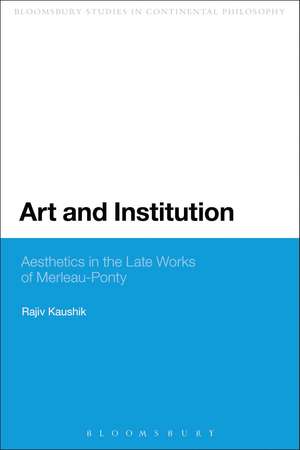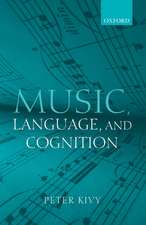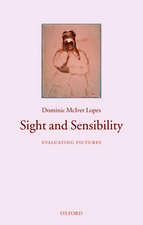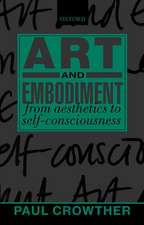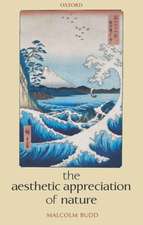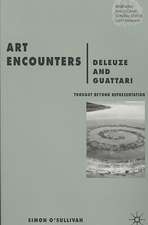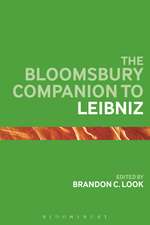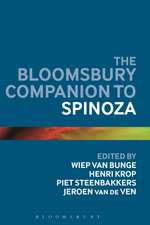Art and Institution: Aesthetics in the Late Works of Merleau-Ponty: Bloomsbury Studies in Continental Philosophy
Autor Professor Rajiv Kaushiken Limba Engleză Paperback – 16 ian 2013
Art and Institution examines how for Merleau-Ponty the work of art opens up, without conceptualizing, the event of being. Rajiv Kaushik treats Merleau-Ponty's renderings of the artwork - specifically in his later writings during the period ranging from 1952-1961 - as a path into the being that precedes phenomenology.
Replete with references to Merleau-Ponty's reflections on Matisse, Cézanne, Proust and others, and featuring Kaushik's own original reflections on various artworks, this book is guided by the notion that art does not iterate the findings of phenomenology so much as it allows phenomenology to finally discover what, as a matter of principle, it seeks: the very foundation of experience that is not itself available to thought. Kaushik is thus concerned with the ways in which the work of art restores the principle of institution, prior to the intentional structures of consciousness, so that phenomenology may settle questions concerning ontological difference, the origination of significance, and the relationship between interiority and exteriority.
Replete with references to Merleau-Ponty's reflections on Matisse, Cézanne, Proust and others, and featuring Kaushik's own original reflections on various artworks, this book is guided by the notion that art does not iterate the findings of phenomenology so much as it allows phenomenology to finally discover what, as a matter of principle, it seeks: the very foundation of experience that is not itself available to thought. Kaushik is thus concerned with the ways in which the work of art restores the principle of institution, prior to the intentional structures of consciousness, so that phenomenology may settle questions concerning ontological difference, the origination of significance, and the relationship between interiority and exteriority.
| Toate formatele și edițiile | Preț | Express |
|---|---|---|
| Paperback (1) | 255.66 lei 6-8 săpt. | |
| Bloomsbury Publishing – 16 ian 2013 | 255.66 lei 6-8 săpt. | |
| Hardback (1) | 888.97 lei 6-8 săpt. | |
| Bloomsbury Publishing – 11 iun 2011 | 888.97 lei 6-8 săpt. |
Din seria Bloomsbury Studies in Continental Philosophy
- 14%
 Preț: 179.26 lei
Preț: 179.26 lei - 23%
 Preț: 179.10 lei
Preț: 179.10 lei - 13%
 Preț: 238.22 lei
Preț: 238.22 lei - 31%
 Preț: 772.98 lei
Preț: 772.98 lei - 30%
 Preț: 773.39 lei
Preț: 773.39 lei - 14%
 Preț: 888.65 lei
Preț: 888.65 lei - 22%
 Preț: 772.98 lei
Preț: 772.98 lei - 13%
 Preț: 258.33 lei
Preț: 258.33 lei - 23%
 Preț: 256.02 lei
Preț: 256.02 lei - 30%
 Preț: 715.00 lei
Preț: 715.00 lei - 22%
 Preț: 773.06 lei
Preț: 773.06 lei - 14%
 Preț: 891.10 lei
Preț: 891.10 lei - 30%
 Preț: 774.20 lei
Preț: 774.20 lei - 13%
 Preț: 257.97 lei
Preț: 257.97 lei - 30%
 Preț: 715.00 lei
Preț: 715.00 lei - 22%
 Preț: 774.62 lei
Preț: 774.62 lei - 13%
 Preț: 256.20 lei
Preț: 256.20 lei -
 Preț: 256.59 lei
Preț: 256.59 lei - 22%
 Preț: 257.50 lei
Preț: 257.50 lei - 13%
 Preț: 257.03 lei
Preț: 257.03 lei - 13%
 Preț: 257.68 lei
Preț: 257.68 lei - 13%
 Preț: 258.15 lei
Preț: 258.15 lei - 30%
 Preț: 715.19 lei
Preț: 715.19 lei - 13%
 Preț: 256.49 lei
Preț: 256.49 lei - 22%
 Preț: 891.10 lei
Preț: 891.10 lei -
 Preț: 255.94 lei
Preț: 255.94 lei - 13%
 Preț: 236.45 lei
Preț: 236.45 lei - 30%
 Preț: 714.92 lei
Preț: 714.92 lei - 30%
 Preț: 773.81 lei
Preț: 773.81 lei - 22%
 Preț: 772.98 lei
Preț: 772.98 lei - 22%
 Preț: 889.08 lei
Preț: 889.08 lei - 30%
 Preț: 714.61 lei
Preț: 714.61 lei -
 Preț: 256.59 lei
Preț: 256.59 lei - 14%
 Preț: 772.98 lei
Preț: 772.98 lei - 22%
 Preț: 257.68 lei
Preț: 257.68 lei - 22%
 Preț: 891.75 lei
Preț: 891.75 lei - 30%
 Preț: 773.81 lei
Preț: 773.81 lei
Preț: 255.66 lei
Nou
Puncte Express: 383
Preț estimativ în valută:
48.92€ • 51.21$ • 40.48£
48.92€ • 51.21$ • 40.48£
Carte tipărită la comandă
Livrare economică 05-19 aprilie
Preluare comenzi: 021 569.72.76
Specificații
ISBN-13: 9780567592484
ISBN-10: 0567592480
Pagini: 192
Ilustrații: black & white illustrations
Dimensiuni: 156 x 234 x 13 mm
Greutate: 0.27 kg
Editura: Bloomsbury Publishing
Colecția Bloomsbury Academic
Seria Bloomsbury Studies in Continental Philosophy
Locul publicării:London, United Kingdom
ISBN-10: 0567592480
Pagini: 192
Ilustrații: black & white illustrations
Dimensiuni: 156 x 234 x 13 mm
Greutate: 0.27 kg
Editura: Bloomsbury Publishing
Colecția Bloomsbury Academic
Seria Bloomsbury Studies in Continental Philosophy
Locul publicării:London, United Kingdom
Caracteristici
This book highlights a set of problems inherent in Merleau-Ponty's later phenomenology and treats his aesthetics as a solution to those problems.
Notă biografică
Rajiv Kaushik is Assistant Professor of Philosophy at Brock University, Canada.
Cuprins
Introduction \ 1. Matisse in Slow Motion \ 2. Art and Natural Being \ 3. Proust and the Significant Event \ 4. Reversibility Between the Arts \ Concluding Remarks \ Bibliography \ Index
Recenzii
Art and Institution takes its starting point from the relatively neglected middle period of Merleau-Ponty's aesthetic thinking, in comparison with its opening moment in Cézanne, and reads it forward into the late ontological figures of Eye and Mind and The Visible and the Invisible. Thus, the notions of institution, language, expression, history, passivity, unconscious, mythic time, and desire are central motifs as well as the art of Matisse and Klee, the cave paintings of Lascaux, and the involuntary memory of Proust's Recherche. Rajiv Kaushik has given us an original study of Merleau-Ponty's aesthetics with new accents that re-awaken and re-energize the philosophy of Merleau-Ponty for our times.
Kaushik's significant exploration of the implications of Merleau-Ponty's claims for art will refigure our understanding not only of Merleau-Ponty's aesthetics, but also of the relationship of art to philosophy. In addressing themes such as painting and the originary institution of expression, art and nature, Proust and the event, as well as the relation of literature to gesture, Kaushik thinks through the institution of meaning that, though originary, still comes out of a style of being that belongs to its time. It is thus always an active passivity. Art and Institution is itself an original work of depth, and precision and is important for those interested in either Merleau-Ponty's philosophy or for those coming to phenomenology through aesthetics.
Rajiv Kaushik's Art and Institution is a book of intrinsic merit, an original work whose scope, profundity, and daring radically reconfigure and revitalize Merleau-Ponty's aesthetics and shape the contours of a new research agenda for the emerging generation of Merleau-Ponty scholars.
Kaushik is at the height of his considerable philosophical talents when he follows his ontological intuitions beyond the increasingly well-known primacy of transcendence in Merleau-Ponty to the ontological status of such transcendence and, finally, to the specific structures of this active transcendence... his book presents a parallel discussion of two groups of concepts that contain the potential for even further insights not only in Merleau-Ponty's work, but perhaps on the mission of philosophy today...Kaushik offers an invitation to bridging one further gap, after that of aesthetics and ontology: that of psychology and ontology. The Merleau-Ponty scholarship, with its concern for all questions of expression, should heed Kaushik's remarkable invitation to reading Merleau-Ponty's ontology as an ontology of constitutive desire, and so should any thinker concerned with the ontological role of creation. -- Frank Chouraqui, Koç University, Turkey
Kaushik's significant exploration of the implications of Merleau-Ponty's claims for art will refigure our understanding not only of Merleau-Ponty's aesthetics, but also of the relationship of art to philosophy. In addressing themes such as painting and the originary institution of expression, art and nature, Proust and the event, as well as the relation of literature to gesture, Kaushik thinks through the institution of meaning that, though originary, still comes out of a style of being that belongs to its time. It is thus always an active passivity. Art and Institution is itself an original work of depth, and precision and is important for those interested in either Merleau-Ponty's philosophy or for those coming to phenomenology through aesthetics.
Rajiv Kaushik's Art and Institution is a book of intrinsic merit, an original work whose scope, profundity, and daring radically reconfigure and revitalize Merleau-Ponty's aesthetics and shape the contours of a new research agenda for the emerging generation of Merleau-Ponty scholars.
Kaushik is at the height of his considerable philosophical talents when he follows his ontological intuitions beyond the increasingly well-known primacy of transcendence in Merleau-Ponty to the ontological status of such transcendence and, finally, to the specific structures of this active transcendence... his book presents a parallel discussion of two groups of concepts that contain the potential for even further insights not only in Merleau-Ponty's work, but perhaps on the mission of philosophy today...Kaushik offers an invitation to bridging one further gap, after that of aesthetics and ontology: that of psychology and ontology. The Merleau-Ponty scholarship, with its concern for all questions of expression, should heed Kaushik's remarkable invitation to reading Merleau-Ponty's ontology as an ontology of constitutive desire, and so should any thinker concerned with the ontological role of creation. -- Frank Chouraqui, Koç University, Turkey
